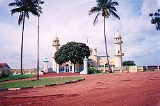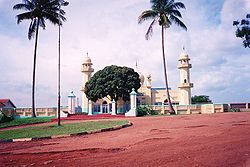
Islam in Uganda
Encyclopedia

History
Islam had arrived in Uganda from the north and through inland networks of the East African coastal trade by the mid-nineteenth century. Some BagandaBaganda
The Ganda are an ethnic group native to Buganda, a subnational kingdom within Uganda. Traditionally comprising 52 tribes the Ganda have a rich history and culture...
Muslim
Muslim
A Muslim, also spelled Moslem, is an adherent of Islam, a monotheistic, Abrahamic religion based on the Quran, which Muslims consider the verbatim word of God as revealed to prophet Muhammad. "Muslim" is the Arabic term for "submitter" .Muslims believe that God is one and incomparable...
s trace their family's conversion to the period in which the kabaka
Kabaka
Kabaka may refer to:*Kabaka of Buganda, the title of the king of Buganda*Kabaka Puttur, a village in the state of Karnataka, India...
Mutesa I converted to Islam in the nineteenth century.
Islam after independence
When Idi AminIdi Amin
Idi Amin Dada was a military leader and President of Uganda from 1971 to 1979. Amin joined the British colonial regiment, the King's African Rifles in 1946. Eventually he held the rank of Major General in the post-colonial Ugandan Army and became its Commander before seizing power in the military...
, a Ugandan Muslim, became president in 1971, his presidency seemed to be a victory for Uganda's Muslim community. Then in 1972, Amin's expulsion of Asians from Uganda reduced the Muslim population significantly. As his administration deteriorated into a brutal and unsuccessful regime, Uganda's Muslims began to distance themselves from those in power.
After Amin's overthrow in 1979, Muslims became the victims of the backlash that was directed primarily against the Kakwa and Nubian ethnic groups who had supported Amin. Yusuf Lule
Yusuf Lule
Yusuf Kironde Lule was provisional president of Uganda between 13 April and 20 June 1979. His name is sometimes spelled Yusufu.-Early years:...
, who served a brief term as president from 1979 to 1980, was also a Muslim (and a Muganda). He was not a skillful politician, but he was successful in reducing the public stigma attached to Islam.
In 1989 President Yoweri Museveni
Yoweri Museveni
Yoweri Kaguta Museveni is a Ugandan politician and statesman. He has been President of Uganda since 26 January 1986.Museveni was involved in the war that deposed Idi Amin Dada, ending his rule in 1979, and in the rebellion that subsequently led to the demise of the Milton Obote regime in 1985...
appealed to Uganda's Muslim community to contribute to national reconstruction, and he warned other Ugandans not to discriminate against Muslims. But at the same time, Museveni admonished Ugandans to avoid "sectarian" allegiances, and this warning was directed at the Islamic community as well as other ethnic and religious groups.
The Islamic University in Uganda
Islamic University in Uganda
The Islamic University in Uganda is a multi-campus university for advanced study at undergraduate and postgraduate levels. The main campus of the university is located in Mbale, Uganda, about northeast of Kampala, Uganda's capital and largest city.-History:The idea to start IUIU was conceived at...
is one of Uganda's premier institutes of Islamic teaching. It is located in Mbale in the foothills of Mount Elgon
Mount Elgon
Mount Elgon is an extinct shield volcano on the border of Uganda and Kenya, north of Kisumu and west of Kitale.- Physical features :It is the oldest and largest solitary volcano in East Africa, covering an area of around 3500 km²....
.
Recent Statistics
The 2002 national census recorded that Muslims represented 12.1% of the population.| Region | % Muslim |
|---|---|
| Central Central Region, Uganda Central Region is a region of Uganda. It is coterminous with the Kingdom of Buganda, one of the ancient African monarchies that are constitutionally recognised in Uganda. It is divided into the following districts:... |
18.4% |
| Eastern Eastern Region, Uganda Eastern Region is a region of Uganda. It is divided into the following districts:... |
17.0% |
| Northern Northern Region, Uganda Northern Region is a region of Uganda. It is divided into the following districts:... |
8.5% |
| Western Western Region, Uganda Western Region is a region of Uganda. It is divided into the following districts:... |
4.5% |
| Total | 12.1% |

